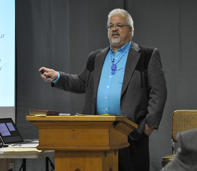
Main menu
- Board Members
- Store
- Course Faculty
- Mission and Partnership
- Online Learning
- Staff
- Synodically Authorized Ministry
- Study Materials (Free)
“The Nations Within: The Legal Context for Ministry Within Tribal Communities”
A crucial dynamic or tension exists when non-Indian congregations ask American Indians to speak to them about American Indians. Most often, non-Indian congregations want to learn more about “Native Spirituality” and the Natives’ “love for nature.” Or, they want to witness the “quaint” cultures they have heard about, asking American Indians to bring their “costumes” (They aren’t costumes; they are regalia.) and perform. Most often, American Indians don’t want to talk about or share these things. They want to talk about the legal context of their everyday lives. They want to talk about tribal sovereignty, legal jurisdiction and legal rights vs. human rights. Many congregations believe it is unwise to talk about politics in “church.” Many American Indians believe that not talking about politics, specifically Federal Indian Law, reduces them to mere objects of mission or relics of a fictional past. American Indians and members of non-Indian congregations can have wonderful, fruitful discussions about many things, if non-Indians realize that the “legal stuff” must be discussed and understood for authentic and respectful dialogue to begin.
Why start with the “legal stuff?” It is not possible to understand American Indian cultures unless one understands the conditions within which these cultures exist. No culture exists in a vacuum. Cultures are not abstract entities; they are living, evolving organisms. They grow and die. They have no “true form” to which they can be restored. They exist in the realities of the “everyday.” One of the primary aspects of racism against American Indian tribes and people is the romantic notions non-Indians have of them. If American Indians can be seen to be mere backdrops to European manifest destiny or as romantic figures of a bygone era, then non-Indians need not acknowledge the legal commitments made to tribal nations, the genocide of whole peoples, or the material benefits currently enjoyed by non-Indians from possession of stolen lands. The current obsession with “Native Spirituality” is an extension of this racialized view of American Indians. Rather than learning from real American Indians and tribal nations how they exist today, non-Indians want to experience “quaint spiritualities of nature worship,” that never actually existed among American Indians. To be part of an authentic ministry with American Indian peoples, we must learn about and wrestle with the relationship of tribal nations to the United States federal government.
Over the two days we are together, we will address four over-arching topics related to Federal Indian Law: 1) A historical overview of the federal government-tribal nation relationship and the foundations of Federal Indian Law, 2) The evolution of tribal governments, sovereignty, and tribal jurisdiction, 3) Landmark Cases in Federal Indian Law, and 4) Federal Indian Law Issues in Wisconsin, Then and Now. Each session (day) will include an opportunity for deep discussion of the topics presented, in addition to questions of clarification and guided questions for small group reflection. Admittedly, there is way more information to be digested than there is time allotted. My hope is that we cover enough ground for you to feel comfortable continuing these discussions with others in your congregations and with tribal members in your area. As my parish pastor was fond of saying, “You don’t need to know everything before you get started in a ministry, but doing a bit of warm up beforehand is recommended.”
Questions & Comments
If you have further questions or comments about Select Learning theological materials, please contact:
Jodi Hanson
jodi@selectlearning.org
NOTE: Please include your church name and address. Thank you.
Newsletter Signup
Sign Up Now
For Email Newsletters you can trust.
Address
Select Learning
1068 Summit Avenue
South St. Paul, MN 55075
P: 877.675.6275
E: info@selectlearning.org
1068 Summit Avenue
South St. Paul, MN 55075
P: 877.675.6275
E: info@selectlearning.org

